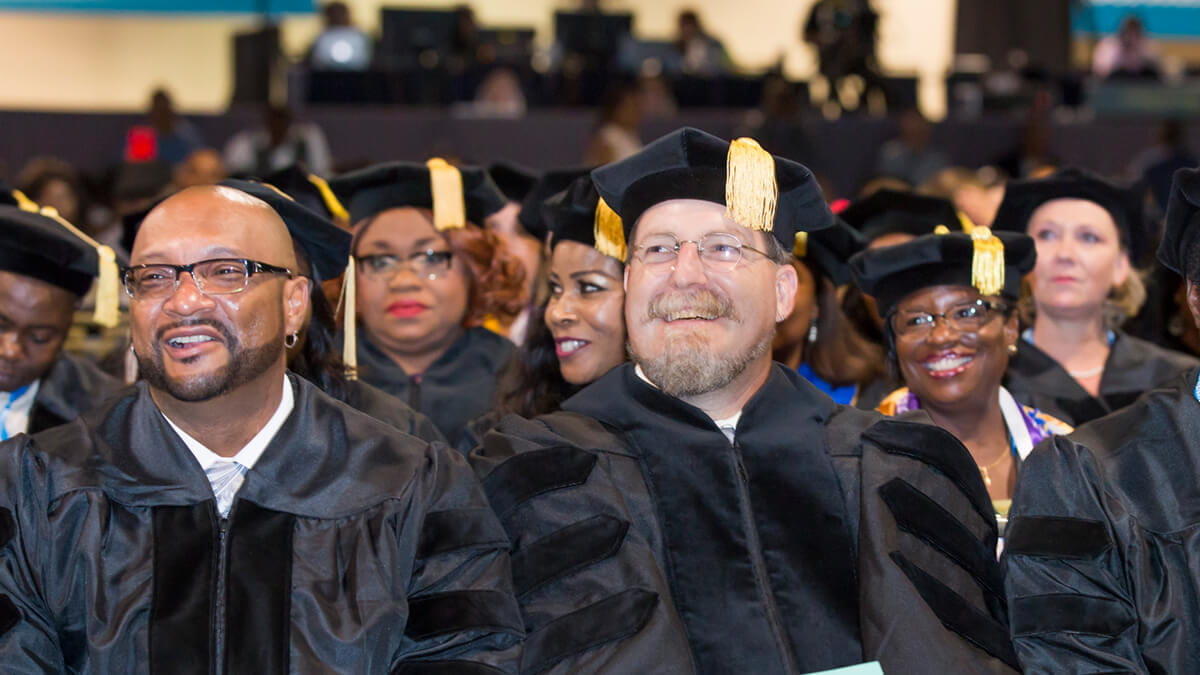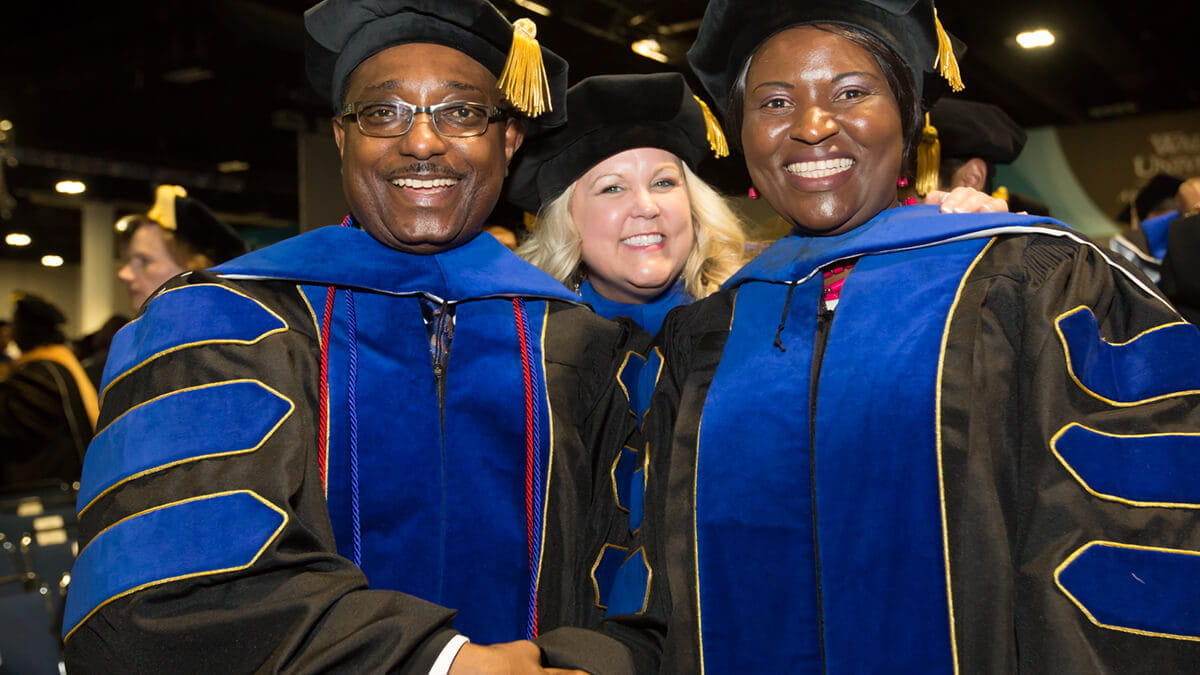Why Earn a Doctorate From Walden?
You have the passion and the drive to achieve something bigger for yourself and those around you. We see your potential, and we want to help you pursue it with a doctoral degree from Walden.
At Walden, we’ll guide you every step of the way with a comprehensive suite of support resources designed to help you confidently pursue the finish line, including our Doctoral Degree CoachTM. Since being founded in 1970 for working professionals who want to make a difference, our university has grown to become the No. 1 granter of doctoral research degrees in the U.S.2
Are you ready to reach a higher level in your field? Let’s help you get started.
What Are the Different Types of Doctoral Degrees?
Earning a doctorate is important in an increasingly complex world where more and more employers, policymakers, and government agencies are turning to experts to help them build the future. A doctorate is the highest academic credential you can achieve, enabling you to develop both personally and professionally. It can empower you to increase your influence, amplify your voice, and bring about meaningful change for yourself and your organization. There are two different types of doctorates you can earn. Both will allow you to put the title “Dr.” in front of your name and can propel you toward your goals, but each is designed for a specific intent.
Walden Online Doctoral Programs
Criminal Justice
Education
Health Sciences
- Doctor of Healthcare Administration (DHA)
- Doctor of Public Health
- PhD in Health Education and Promotion
- PhD in Health Services
- PhD in Public Health
Nursing
Psychology and Counseling
- PhD in Clinical Psychology
- PhD in Developmental Psychology
- PhD in Forensic Psychology
- PhD in Industrial and Organizational Psychology
- PhD in Psychology
- PsyD in Behavioral Health Leadership
- PhD in Counselor Education and Supervision
Public Policy and Administration
Social Work and Human Services
What Will My Doctoral Journey Look Like?
Whether you choose an academic or professional doctorate, the steps you’ll take to earn your degree will be the same. During the first phase, you’ll take classes, start to formulate potential research topics, learn essential research skills, and interact with faculty and fellow students.
Coursework
1 Foundation courses
Gain a broad overview of your field based on the latest research and advancements.
2 Core courses
Explore various key aspects of your field in more depth.
3 Specialization courses
Engage in rigorous study of one or more focused topics in your field.
4 Research methods courses
Learn fundamental concepts necessary for conducting research at the doctoral level.
5 Capstone preparation courses
Define and explore a topic for your capstone. The capstone is a dissertation for PhD students and a doctoral study for professional doctoral students.
Academic Residencies
In most Walden doctoral programs, you’ll attend one or more residencies. We typically schedule a combination of virtual and in-person residencies across the U.S. These events bring students together with faculty and academic support services to help brainstorm topics, learn research techniques, and polish writing skills.
The few days you spend at your residency will allow you to connect with faculty, forge friendships with other students, and immerse yourself in academic culture. Many graduates look back on their academic residencies as one of the most inspirational aspects of their program.
Doctoral Capstone

After completing your coursework, you’ll focus on the capstone—the final stage of your doctoral journey. While it will take a great deal of time and effort, it’s an exciting experience that allows you to examine a specific problem in your discipline.
Am I Ready to Pursue a Doctorate at Walden?
Make no mistake: Earning a doctoral degree will be challenging. It takes focus, dedication, and perseverance. Now that you know more about the process and what’s involved, the next step is to determine how prepared you are to begin your program. You can start by taking inventory of your academic skills and program prerequisites.
Fitting Doctoral Study Into Your Life
Earning a doctorate is no small undertaking—it will consume a substantial amount of your time over a period of years. Before you commit your time and resources to entering a doctoral program, you should be able to confidently answer “yes” to the following questions.
Frequently Asked Questions
To be successful, you have to be able to do the work. If you don’t have a dedicated space where you can focus without distraction, completing your degree will be difficult. Your workspace doesn’t have to be where you live—coffeehouses with Wi-Fi or a nearby public library work well—but it does have to be easily accessible and quiet.
Before you enroll, you should talk with your family, friends, or anyone else you live with. Throughout your program, they will have to make sacrifices—your doctorate will be your priority and you may not be able to focus as much time on other areas of your life. If you don’t have support, you may face competing priorities that will complicate your ability to finish your program.
While it’s not a requirement that your employer or supervisor supports your doctoral pursuit, it helps. If they don’t understand the time commitment you’re making, you may struggle to find the time you need to complete your assignments or the research and writing your degree will require.
You’ll need a certain level of technology to attend class and complete assignments (see Walden’s list of minimum technology requirements). However, the requirements are minimal, and we provide technical support to guide you through any issues you may encounter.
-
Doctoral Degree Coach™: Your guide along the doctoral path, offering interactive checklists, a progress tracker, and reminders.
-
Office of Research and Doctoral Services: Your one-stop shop for help with research and the research ethics review process.
-
Writing Center: A valuable resource for honing your writing skills and receiving feedback and guidance on papers.
-
Doctoral Peer Mentor Program: Where you can connect with an experienced doctoral student who will provide advice, tips, and guidance during your program.
-
Office of Student Experiential Learning Services: For those interested in field research experiences, study abroad, and other experiential learning opportunities.
-
Academic Skills Center: A resource for help with everything from writing your dissertation to passing your advanced statistics class.
-
Walden Library: A comprehensive online hub featuring research materials, research databases, full-text journals, electronic books, videos, and dissertations.
-
Disability Services: Support to help students with disabilities access Walden resources and achieve academic success.
-
Military Services: Provides support to military students and their families through collaboration, education, and advocacy.
Testimonials
What Happens After I Graduate?
Once you earn your doctoral degree, you will
join the elite ranks of scholars and scholar-practitioners.
But even after graduation, we
will still be here to support you:
-
Walden alumni network: Walden has more than 147,000 alumni in more than 165 countries. Our Office of Alumni Relations sponsors regular events that bring graduates together for fellowship and networking. Alumni chapters all over the globe also regularly host events to promote lifelong learning and provide opportunities for professional networking.
-
Career services: The Walden Career Planning and Development team can help you navigate the job marketplace, enhance your professional skills, and stay up to date on the latest career trends in your field.
-
Walden magazine: This biannual publication is packed with inspirational stories, news about alumni achievements, career advice, and more.
-
Walden University Alumni Library: This online resource provides access to the kind of world-class scholarship you need to keep learning and growing.
(Left) Philip Terry-Smith ’92, PhD in Human Services (Right) Justin Terry-Smith ’18, Doctor of Public Health
Related Articles
1Source: U.S. Census Bureau, Current Population Survey, 2020 Annual Social and Economic Supplement. (Retrieved August 2021).
2Source: National Center for Education Statistics (NCES) Integrated Postsecondary Education Database (IPEDS). Based on the most recent year of completions survey data available, using all classifications of instructional programs (CIP) codes. A doctoral research degree is a PhD or other doctoral degree that requires advanced work beyond the master’s level, including the preparation and defense of a dissertation based on original research or the planning and execution of an original project demonstrating substantial scholarly achievement. Some examples of this type of degree may include EdD, DMA, DBA, DSc, DA, DM, or others, as designated by the awarding institution. Available at https://nces.ed.gov/ipeds/use-the-data. (Retrieved March 2020; may consist of or include provisional release data.)












